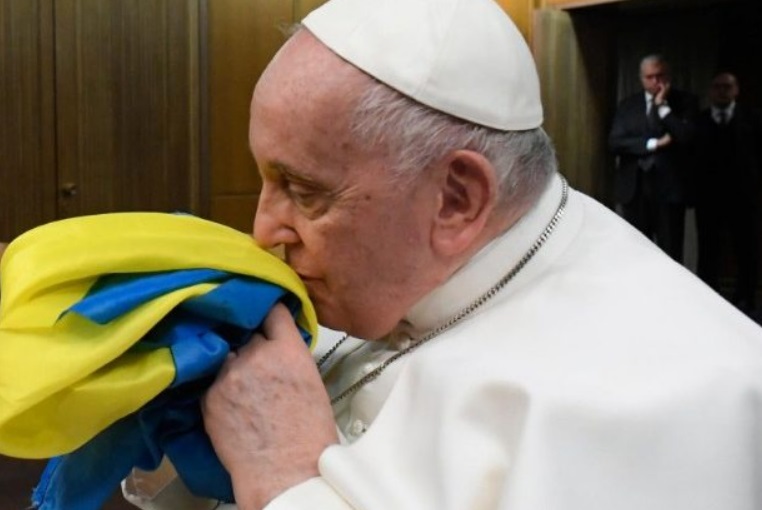Why can’t we live in peace?
The Pope himself, seated in the back row, watched the documentary and met at the conclusion with some of the documentary’s protagonists.
Mar 03, 2023

“Why can’t we live in peace? It’s so simple...” With those heartbreaking words and much emotion, a Ukrainian child posed that question to the world in the documentary Freedom on Fire: Ukraine’s Fight for Freedom. The production by film director Evgeny Afineevsky was viewed on February 25 at the Vatican’s New Synod Hall on the day marking the one-year anniversary of what Pope Francis has called an “absurd” war.
The Pope himself, seated in the back row, watched the documentary and met at the conclusion with some of the documentary’s protagonists. The Pope gave his blessing to all of them and asked them to pray together at the end of the documentary. “Let us pray!” he said in English, visibly moved by the documentary, characterised by its stark images and realism, revealing the horrors of war. The documentary expresses the fear of an entire people, particularly in one scene when one of the protagonists makes an appeal for an end to the war as soon as possible, or if it continues on this path “we will all destroy ourselves”.
Pope Francis also spoke of war destruction in the prayer he recited with those present, asking the Lord to heal humanity from the flow of hatred that fuels war: “When God made man, he said to take the earth, make it grow, make it beautiful. The spirit of war is the opposite: to destroy, to destroy, not to let grow, to destroy everyone, men, women, children, the elderly, everyone,” the Pope explained. He added, “Today marks one year of this war. Let us look at Ukraine, let us pray for Ukraine, and open our hearts to sorrow. Let us not be ashamed to suffer and weep, for war is destruction, a war always diminishes us. May God make us understand this.”
The Pope offered a prayer in conclusion, saying, “Our Father who art in heaven... look on our failings, look at our wounds, see our pain, look also on our selfishness, our lowly interests and the capacity we have to destroy. Heal our hearts, heal our minds, heal our eyes so that they are able to see the beauty that you have made and that we may not destroy it through our selfishness. Sow in us the seed of peace.”
One year after the aggression against Ukraine perpetrated by the Russian Federation, more than seventeen million people in the attacked country are in need of humanitarian assistance; eight million are refugees abroad; and six million are internally displaced. There are more than twenty thousand civilian casualties, and about one hundred thousand military casualties on both fronts.
In the face of this senseless carnage in the heart of Christian Europe, where soldiers who share the same baptism are fighting each other, a massacre that is leading humanity towards self-destruction by ever faster steps, one cannot help but take up the dramatic question that the Successor of Peter addressed to the international community and to each one of us: “Has everything possible been done to stop the war?” It is difficult to answer “yes” in the face of the apathy and lack of creativity of diplomacy and of international bodies. It is difficult to answer “yes” in the face of the acceleration of the arms race and the single-minded militaristic rhetoric that stigmatises any doubts about war escalation.
Pope Francis has made countless appeals, crying out, in harmony with his predecessors, his heartfelt “No to war!” It is the same “Never again war!” that St Paul VI pleaded in front of the United Nations Assembly on October 4, 1965; it is that “Never again war!” that St John Paul II cried out – ill and unfortunately unheard – at the Angelus of March 16, 2003, to avert the wretched invasion of Iraq, the consequences of which are still visible to all after the transformation for many years of that country into the breeding ground of all fundamentalist terrorism.
Pope Francis’ appeal is addressed to “those who have authority over nations to make a concrete commitment to end the conflict, to achieve a cease-fire and to start peace negotiations,” because a victory “built on rubble will never be a true victory!” And the wounds of hatred and resentment that the barbarity of war has caused will remain for certainly longer than the time needed to rebuild Ukraine.
In the face of all this, the commitment of those who help the victims and welcome the displaced is a concrete sign of hope, pointing the way to fraternity, non-violence, and peace. There is a civil society that marches, prays, works for, and invokes peace — like the one that walked from Perugia to Assisi on Feb 25. A civil society whose voice deserves more space. There are people, believers and non-believers, who are asking the aggressor, Vladimir Putin, to stop; and asking all governments – beginning with those of the most powerful countries — to bet on peace and not on the inevitability of a devastating conflict that is destined to increasingly mark the future of Europe and all humanity. Are we doing all we can to stop this war? -- Vatican News







Total Comments:0